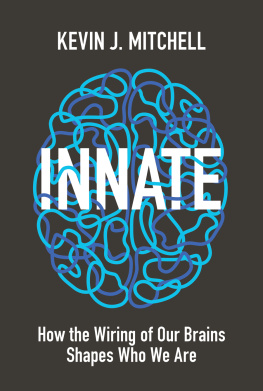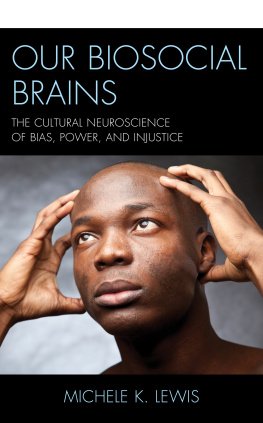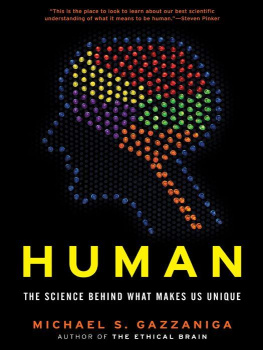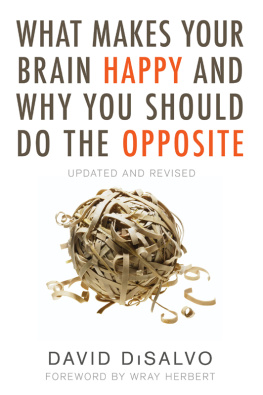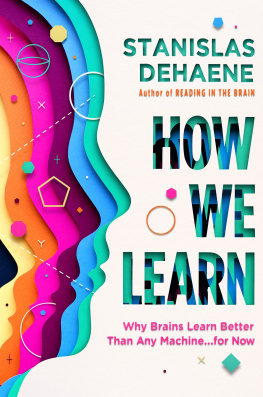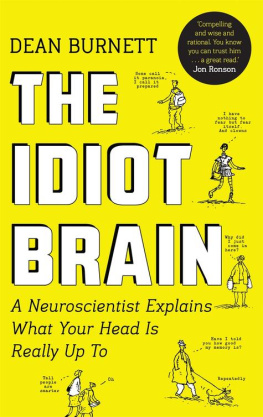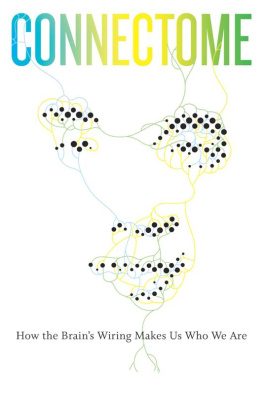INNATE
INNATE
How the Wiring of Our Brains
Shapes Who We Are
KEVIN J. MITCHELL
PRINCETON UNIVERSITY PRESS
PRINCETON AND OXFORD
Copyright 2018 by Princeton University Press
Published by Princeton University Press
41 William Street, Princeton, New Jersey 08540
6 Oxford Street, Woodstock, Oxfordshire OX20 1TR
press.princeton.edu
All Rights Reserved
Library of Congress Control Number: 2018937061
ISBN 978-0-691-17388-7
British Library Cataloging-in-Publication Data is available
Editorial: Alison Kalett and Lauren Bucca
Production Editorial: Jenny Wolkowicki
Text and Jacket Design: Lorraine Doneker
Production: Jacqueline Poirier
Publicity: Sara Henning-Stout
Copyeditor: Maia Vaswani
This book has been composed in Minion Pro with Din for display
Printed on acid-free paper.
Printed in the United States of America
10 9 8 7 6 5 4 3 2 1
For my parents,
with my undying thanks for their nature and their nurture.
CONTENTS
ACKNOWLEDGMENTS
I am very grateful to numerous friends and colleagues for thoughtful discussions over many years, which have informed the ideas presented in this book, including Cori Bargmann, Alain Chedotal, Aiden Corvin, Kevin Devine, John Foxe, Michael Gill, Corey Goodman, Josh Gordon, Josh Huang, Andrew Jackson, Annette Karmiloff-Smith, Mary-Claire King, David Ledbetter, Gary Marcus, Oscar Marin, Aoife McLysaght, Partha Mitra, Bita Moghaddam, Scott Myers, Fiona Newell, Shane OMara, Mani Ramaswami, Ian Roberston, John Rubenstein, Carla Shatz, Bill Skarnes, Marc Tessier-Lavigne, and many others, especially all the past and current members of my lab. I should include in this list a huge number of people who have been kind enough to engage in scientific or philosophical discussions on the Wiring the Brain blog or on Twitter, which have been invaluable in enriching and sharpening my thinking. I am especially grateful to Abeba Birhane, Sarah-Jayne Blakemore, Dan Bradley, David Delany, Adam Kepecs, Tim Lewens, David McConnell, Lynn Mitchell, Tara Mitchell, Thomas Mitchell, Svetlana Molchanova, Stuart Ritchie, Richard Roche, Siobhan Roche, and Adam Rutherford for very helpful feedback on chapters of the book. I would also like to sincerely thank the three anonymous reviewers for their support and valuable suggestions. And I am extremely grateful for all the support from Princeton University Press, especially to my editor Alison Kalett, for her encouragement, insight, and expert advice throughout the process of writing this book.
INNATE
CHAPTER 1
ON HUMAN NATURE
How would you describe yourself? If you had to list some personality traits, say for a dating website or a job application, what words would you use? Do you consider yourself shy or outgoing? Are you cautious or reckless? Anxious or carefree? Are you creative, artistic, adventurous, stubborn, impulsive, sensitive, brave, mischievous, kind, imaginative, selfish, irresponsible, conscientious? People clearly differ in such traits and in many other aspects of their psychologysuch as intelligence and sexual preference, for example. All of these things feed into making us who we are .
The question is, how do we get that way? This has been a subject of endless debate for literally thousands of years, with various prominent thinkers, from Aristotle and Plato to Pinker and Chomsky, lining up to argue for either innate differences between people or for everyone starting out with a blank slate and our psychology being shaped by experience alone. In the past century, the tradition of Freudian psychology popularized the idea that our psychological dispositions could be traced to formative childhood experiences. In many areas of modern academic sociology and psychology this belief is still widespread, though it has been extended to include cultural and environmental factors more broadly as important determinants of our characters.
But these fields have been fighting a rearguard action in recent years, against an onslaught from genetics and neuroscience, which have provided strong evidence that such traits have at least some basis in our innate biology. To some, this is a controversial position, perhaps even a morally offensive one. But really it fits with our common experience that, at some level, people just are the way they arethat theyre just made that way. Certainly, any parent with more than one child will know that they start out different from each other, in many important ways that are unrelated to parenting.
This notion of innate traits is often equated with the influences of genesindeed, innate and genetic are often used interchangeably. This idea is captured in common phrases such as the apple doesnt fall far from the tree, or he didnt lick it off the stones. These sayings reflect the widespread belief that many of our psychological traits are not determined solely by our upbringing but really are, to some extent at least, in our DNA.
How that could be is the subject of this book. How could our individual natures be encoded in our genomes? What is the nature of that information and how is it expressed? That is, in a sense, just a different version of this question: How is human nature, generally, encoded in the human genome? If there is a program for making a human being with typical human nature, then our individual natures may simply be variations on that theme. In the same way, the human genome contains a program for making a being about so tall, but individual humans are taller or shorter than that due to variation in the programs encoded in their respective genomes. We will see that the existence of such variation is not only plausibleit is inevitable.
BEING HUMAN
If we think about human nature generally, then we should ask, first, whether it even exists. Are there really typical characteristics that are inherent in each of us that make humans different from other animals? This question has exercised philosophers for millennia and continues to today, partly because it can be framed in many different ways. By human nature, do we mean expressed behaviors that are unique to humans and not seen in other animals? Do we mean ones that are completely universal across all members of the species? Or ones that are innate and instinctive and not dependent at all on maturation or experience? If those are the bars that are set, then not much gets over them.
But if instead we define human nature as a set of behavioral capacities or tendencies that are typical of our species, some of which may nevertheless be shared with other animals, and which may be expressed either innately or require maturation or experience to develop, then the list is long and much less contentious. Humans tend to walk upright, be active during the day, live in social groups, form relatively stable pair-bonds, rely on vision more than other senses, eat different kinds of food, and so on. A zoologist studying humans would say they are bipedal, diurnal, gregarious, monogamous, visual, and omnivorousall of these traits are shared by some other species, but that overall profile characterizes humans.
And humans have capacities for highly dexterous movements, tool use, language, humor, problem solving, abstract thought, and so on. Many of those capacities are present to some degree in other animals, but they are vastly more developed in humans. The actual behaviors may only emerge with maturation and many depend to some extent on learning and experience, but the capacities themselves are inherent. Indeed, even our capacity to learn from experience is itself an innate trait. Though our intellect separates us from other animalsby enabling the development of language and culture, which shape all of our behaviorsour underlying nature is a product of evolution, the same as for any other species.

